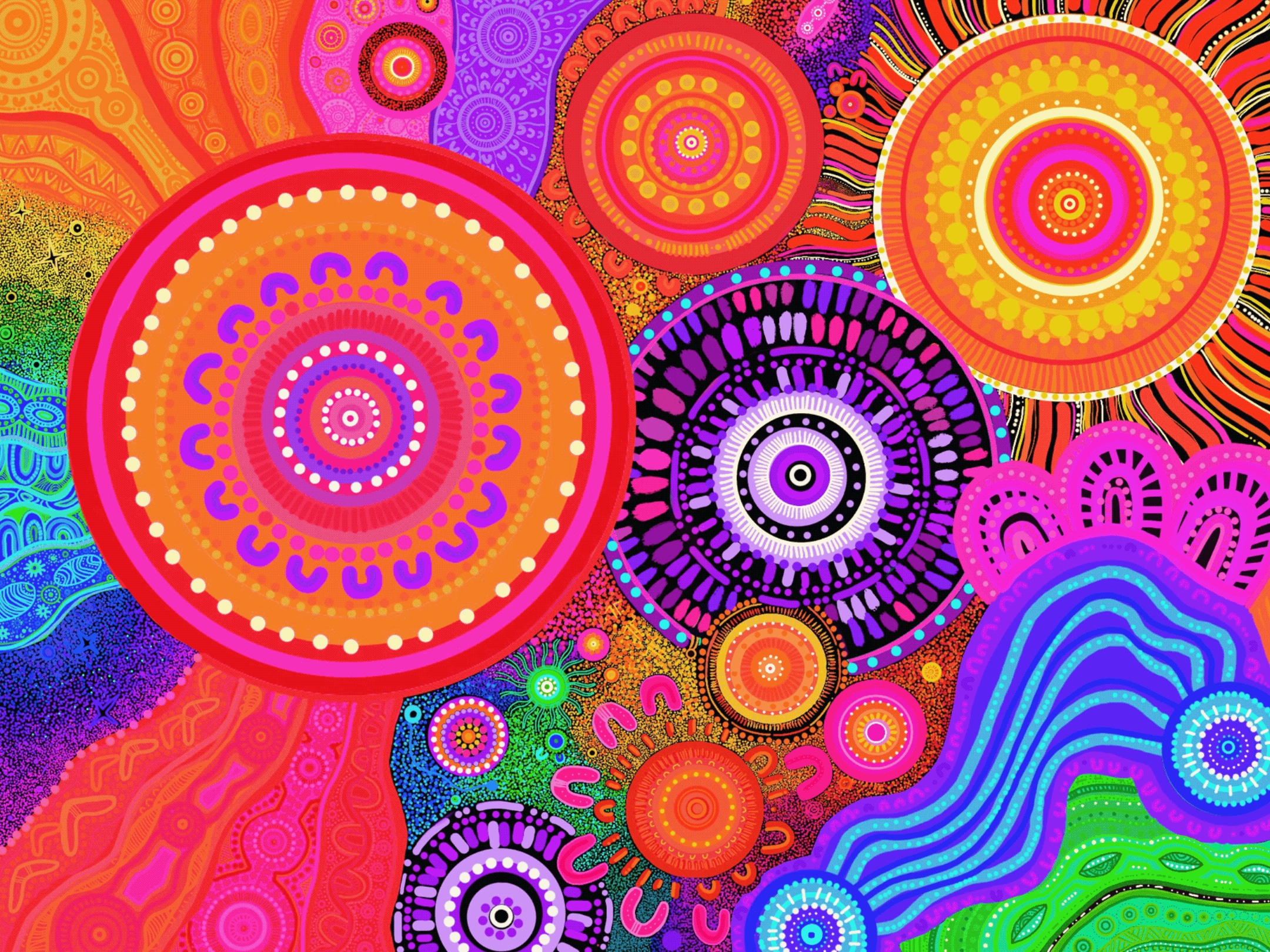
About the 2024 Innovate RAP
Through our 2024 Innovate RAP, DCA will build on our past Innovate RAP and the work we have done, and continue to do, to promote true reconciliation. We will do so by taking an aspirational and innovative approach to our commitment to create an Australia that takes meaningful action on reconciliation between Aboriginal and Torres Strait Islander peoples and non-First Nations people. Importantly this work is informed and led by Aboriginal and Torres Strait Islander peoples.
Our aim is to improve on our previous Innovate Reconciliation Action Plan by creating more substantial and significant deliverables, strengthening our current position and setting a firm foundation for our future RAP development.
About the Artwork
Buranbaa Ngarran (New Dawn) by artist Kirsten Gray
“The piece is bright and bold and speaks to the hope for the future between First Nations people and non-Indigenous Australians and amongst First Nations people themselves.
It shows many communities coming together from across the country to rally around justice for First Nations people. You can see this in the large pink circle on the left and all the different colours interacting with it. These represent all the diverse populations coming in to answer the call for a better Australia for us all. Important discussions are being had by and with First Nations people about Voice, Treaty, Truth, and beyond. It is a long and ongoing journey.
You can see a new day breaking in the background and community and Country flourishing in the right-hand side of this piece as these changes take hold.
This piece represents the hope around national conversations to change the Constitution through the Referendum and the long call for justice for First Nations people. It envisions the positive change that will flow from this, an act that will unite all Australians and provide the basis for substantive outcomes for First Nations people now and into the future.”

“Since 2006, RAPs have provided a framework for organisations to leverage their structures and diverse spheres of influence to support the national reconciliation movement.
“With close to 3 million people now either working or studying in an organisation with a RAP, the program’s potential for impact is greater than ever. Diversity Council Australia continues to be part of a strong network of more than 2,200 corporate, government, and not-for-profit organisations that have taken goodwill and transformed it into action.”
-Karen Mundine, CEO, Reconciliation Australia
DCA's RAP Working Group
Our RAPs have been developed by DCA’s RAP Working Group, led and chaired by Simone Empacher Earl, DCA’s Indigenous Liaison and proud Awabakal woman from the NSW Hunter Valley.
RAP Champions
- Catherine Hunter, DCA’s Chief Executive Officer and RAP Champion
RAP Working Group
- Simone Empacher Earl, Events Manager and Aboriginal Advisor (Chair)
- Catherine Petterson, Operations Director,
- Deborah Wu, Diversity & Inclusion Research Manager,
- Nicole Kindred, Communications Advisor, and
- Clea Newson, People & Culture Lead
DCA also consulted with staff and the DCA Board of Directors, during this process, to ensure support throughout all levels of the organisation.
About the 2021 Innovate RAP
Our Innovate RAP builds on the work DCA has done to promote reconciliation. Through our Innovate RAP we hope to develop an aspirational and innovative approach to our commitment to creating an Australia that takes meaningful action on reconciliation between Aboriginal and Torres Strait Islander peoples and non-Indigenous people, in a way that is informed and led by Aboriginal and Torres Strait Islander peoples.
Our Innovate RAP is a framework to work together to develop innovative strategies to ensure the self-determination and inclusion of First Nations People in our workplaces. We will continually review our work to ensure we proceed to improve, as individuals and as an organisation, in this area.
About the 2019 Reflect RAP
Our ReflectRAP was developed on the basis of two guiding principles: Inclusion and Reconciliation.
DCA defines inclusion as occurring when a diversity of people feel valued and respected, have access to opportunities and resources, and can contribute their perspectives and talents to improve their organisation. Genuine inclusion must begin with reconciliation. There can be no genuine workplace inclusion while our First Nations Peoples are excluded from opportunities, and we as a nation do not address race relations, equality and equity, unity, institutional integrity, and historical acceptance.
